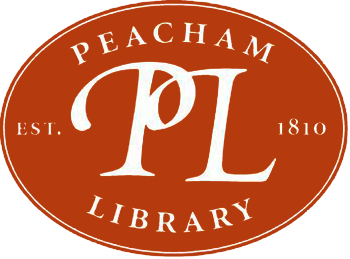Presented at the Centennial Celebration of the Peacham Library, August 1910
A hundred years is a short time in the history of the world. And yet much has happened in the century that has elapsed since the Juvenile Library was founded. Our country was then about to engage in a second war with Great Britain. . . . Followed other wars, some now, like those with Tripoli and Algiers, all but forgotten. Came finally the inevitable civil strife which knitted irrevocably the bonds of union and incidentally freed the slaves. . . . It is interesting to note that while the population of the United States has increased from six millions to ninety millions since the Juvenile Library was organized, the residents of Peacham are actually fewer in number. . . . New England townships have constituted the seed-ground of the Nation. The great West has become the granary. . . . And Peacham has done its full share in supplying brain and brawn for the development of the whole. . . . In connection with this celebration, thoughts revert naturally to one resolute personality – Thad Stevens. To him belongs the credit, not, of course, of founding the library, but clearly of rejuvenating it. His bequest . . . imbued it with new life, awakened fresh interest among the people, and continues to this day a primary source of supply. Sixty dollars a year seems little, but already the aggregate has reached nearly three thousand dollars, and the period of beneficence has hardly begun.
…Thad Stevens made his bequest in loving memory of his mother. …Her husband was a shiftless cobbler and disappeared from his home in Danville about 1812, leaving his widow penniless and his children destitute. Of the sons, Thaddeus was the puny one. Consequently, as the custom was… he was marked for a collegiate career. With that purpose in mind his mother moved from Danville to Peacham.
…God knows we never can repay the debt of a child to his mother. …But we may upon occasion like this fittingly bear testimony to our appreciation of that which we owe by inheritance to the mother town and the mother State. …the truth is that the record of Vermont as a resolute champion of individual freedom, as a true interpreter of our fundamental law, as a defender of religious faith, as an unselfish but independent and uncompromising commonwealth of liberty-loving patriots, is…unmatched by any other State in the Union. That sounds like an exaggerated statement … It is really no more or less than a proposition of plain fact capable of easy and conclusive demonstration…
Vermont stood unrecognized, even unnamed, in those dark days preceding the Revolution. …The story of Vermont during the succeeding fourteen years is the most fascinating ever written of any State. Surely history does not record an act more audacious than that of those determined men who not only set themselves up as a free and independent republic, but successfully maintained the integrity of their government against Congress, New York, and Canada by force of arms. …How can we account for the sagacity manifested by those untutored men who wrote into their fundamental law an eternal edict against human slavery? Nowhere else upon this continent had such a statute been enacted or even suggested. To Vermont, not as a vassal of Great Britain, not as a part of the United States, but as an independent republic, fell the honor and the glory of lighting the torch of universal liberty.
When the first test of the new government took place over the great question which subsequently plunged the Nation into civil war, whence came the clear note of liberty and union blended and indivisible? …We can even now feel the indignation of our forebears when their representative in Congress was arrested, tried, convicted, fined, imprisoned for violating the hateful Sedition Act. We can sympathize with the spirit which induced them to re-elect Matthew Lyon while he was still serving his term in prison. . . . We can revel in the picture of that long line of sleighs stretching along the Great Otter all the way from Vergennes to Middlebury as an escort for the released patriot. All this and all else that they could do within the law to show their resentment they did, but no more.
…How fitting it was that, three years later when a Congress had been elected to repeal the obnoxious statute and the choice of a President devolved upon the House of Representatives, Vermont was enabled to make that repeal certain by casting the one deciding vote that sent Thomas Jefferson to the White House instead of Aaron Burr.
… Pitiable, indeed, must be the spirit of one not proud to own such a town as his mother town and such a commonwealth as his mother State. Seated high among the beautiful hills, she still keeps alight the torch of liberty under the law.
True as steel to the Union she has proven. …But it is not without a thrill of exultation that we realize that the flag under which we sit to-night is … the flag of the free and independent Republic of Vermont, adopted by the same convention that abolished slavery, the first flag made in all the world that guaranteed universal freedom, the flag that was maintained for thirteen long years against odds that might have dismayed the heroes of Sparta, the flag untarnished, its blue and gold as pure as the gleaming snow which soon will rest lovingly upon the verdant hills, the fruitful meadows and the little churchyards about which there cluster memories so precious and so sacred that, like the storied Zion to the Hebrew singer of old, “her very dust to us is dear.”
